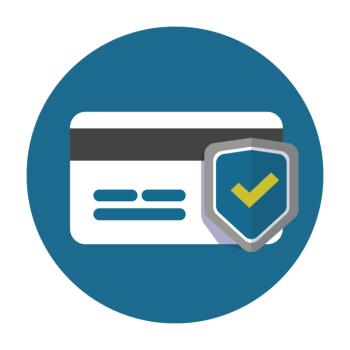A series of financial security tips
Whether you have misplaced a credit card or had a purse or wallet stolen, the loss of personal identification and financial information can be a major concern. Knowing the right precautions to take can help safeguard your financial freedom and prevent devastating losses to your cash reserves and credit rating.

Try these suggestions to deter financial and personal ID thieves:
- Check with your credit card companies or banking institutions. Different vendors offer their own level of security measures, such as spending limits, travel advisories, and even alerts you can set to text you when a transaction occurs.
- Make a list of all your credit cards, accounts, and memberships. Write down the company name, account number, address, and toll-free phone number, and store this list in a safe, secret place (not on your person). Be sure to add any new cards or accounts you obtain to this list.
- Handle Personal Identification Numbers (PINs) carefully. Never carry a written PIN with you. Create unique PINs (do not use your birth date, any part of your name or maiden name, Social Security Number, or anything else that could be easily identified by thieves), and memorize them.
- Sign the back of any new credit card. Be sure to do so in permanent ink to prevent unauthorized persons from using your card.
- Carry only those cards that are necessary. Try to carry these cards separately from your wallet or purse if you can, in a zippered compartment, secure pocket or small pouch, for example.
- Never give a clerk or cashier any personal information when using your credit cards. By law, you are not required to give out this information. Also, if you are paying by check and the cashier requires a credit card as identification, do not allow the cashier to write down your credit card number on your check.
- Watch your card carefully during the transaction. Be sure other shoppers cannot read the card. Do not allow the cashier to take your card away from the register, and get your card back as quickly as possible.
- Never sign a blank receipt. Draw a line through any blank spaces. Be sure the total box is filled in.
- Shield your card and the ATM monitor whenever you use a cash machine. Also, shield your card and the telephone whenever you use a calling card.
- Never lend your card to anyone. Even if there are people you think can be trusted, it is safer to keep your cards solely in your possession.
- Cancel all unnecessary cards that you do not plan to use. Call the issuer to request that the card be canceled, and then cut up the card into several pieces. Have the issuer verify your request in writing.
- Use a crosscut shredder. Shred documents such as all credit card and ATM receipts, bills, check carbons, and account statements after you have verified their accuracy. Also, remember to destroy unsolicited pre-approved credit card applications that arrive in the mail.
- Check your monthly billing and account statements promptly when they arrive. Reconcile these accounts and resolve any disputes with card issuers, financial institutions, and vendors as necessary. Remember that you have the right to withhold payment for any disputed amount without incurring penalty fees until the card issuer can investigate the matter and render a decision.
- Avoid giving out any account numbers over the phone. Unless the company or vendor is a familiar, reputable one you can trust. This is especially important if someone else made the call. If you feel the call is legitimate, ask the caller for a number where you can call them back, or ask that they mail you more information. If you are not sure about the company, check with your local Better Business Bureau.
- Request your name be removed from marketing and junk-mail lists. This can cut down on the number of unsolicited credit card applications (which can be easily stolen) you receive via mail. Call (888) 5-OPT-OUT for details.
- Check to see if your homeowner’s insurance policy covers liability for credit card theft. If it does not, consider upgrading your policy to provide this coverage.
- Consider a credit card registration service. Many companies offer card protection or registration services that automatically notify all creditors on your behalf after you report the loss or theft of your cards via a special toll-free number. Annual costs vary from $10 to more than $35.
The information contained in this post is intended for educational purposes only; content was provided by Work-Life Solutions, WashU’s employee assistance program vendor. If you would like to do a deeper dive or talk with someone about your specific situation, consider the following resources:
